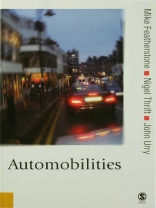Mobility – flows, movement and migration in social life – has emerged as a central area of sociological debate, yet one of its most dominant forms, automobility, has remained largely ignored. Edited by three leading social analysts,
Automobilities presents one of the first and most wide-ranging examinations of the car and its promise of autonomy and mobility. Drawing on rich empirical detail, from ethnographies of office work on the motorway to the important of the car in French cultural theory, the contributions demonstrate just how significant have been the economic, technological, social and political consequences of a pervasive and accelerating culture of the car.
A broad array of theories are put to work to illuminate this vast and yet neglected topic: strategy and tactics, complexity theory, performativity, actor network theory, film theory, material culture, theories of non-places, embodiment, sensuous geography/sociology, ethnomethodology and non-representational theory.
This book will firmly establish automobilities as a key topic for theory and research. Automobilities represents a landmark text that will contribute to and provide a significant impetus for the emerging analysis of mobilities in contemporary societies.
Mục lục
Introduction – Mike Featherstone
The ′System′ of Automobility – John Urry
Driving in the City – Nigel Thrift
The Driver-Car – Tim Dant
Mobility and Safety – Jörg Beckmann
Automobility and National Identity – Tim Edensor
Representation, Geography and Driving Practice
Cars and Nations – Rudy J Koshar
Anglo-German Perspectives on Automobility Between the World Wars
Driving Places – Peter Merriman
Marc Augé, Non-Places and the Geographies of England′s M1 Motorway
Three Ages of the Automobile – David Gartman
The Cultural Logics of the Car
Auto Couture – David Inglis
Thinking the Car in Post-War France
Automotive Emotions – Mimi Sheller
Feeling the Car
Automobility and the Power of Sound – Michael Bull
Doing Officework on the Motorway – Eric Laurier
Giới thiệu về tác giả
His main research in recent years has been in advocating and developing a new paradigm for the social sciences, the new mobilities paradigm












